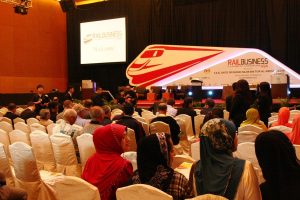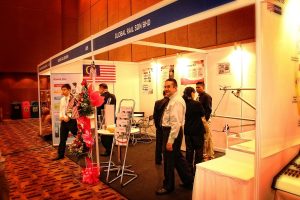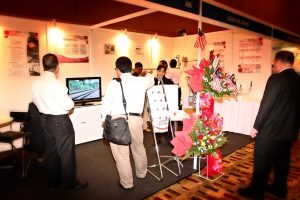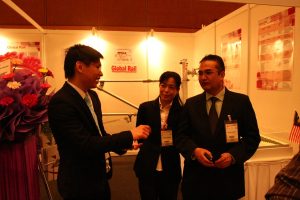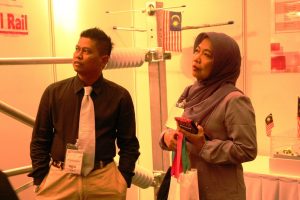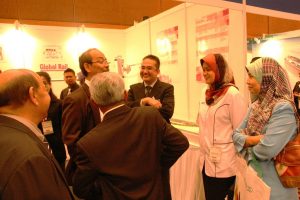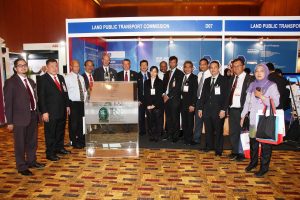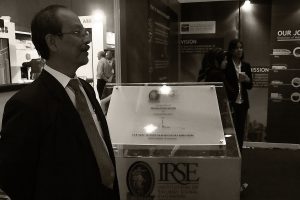Rail Business Asia 2013 was held in Malaysia at the Kuala Lumpur Convention Centre from 10-12 September 2013. Rail Business Asia 2013 was officiated by the 6th Prime Minister of Malaysia, YAB Dato’ Sri Mohd Najib Bin Tun Hj Abdul Razak, which drew more than 600 guests during the Opening and Launch Ceremony.
The 6th Prime Minister also witnessed the MoU signing between SPAD and the Institution of Railway Signal Engineers (IRSE) to launch the Malaysian Chapter, at Rail Business Asia 2013. Global Rail was one of the exhibitors on site and also the plaque sponsor for the Malaysian Chapter of Institution of Railway Signal Engineers (IRSE).
Notable attendees from Global Rail include Mr Fan Boon Heng, Mr Zulkifli Md. Hussain, Ir. Zainuddin Mohamed, Miss Foong May Ling, Mr Wilson Fan & Dato Salleh (Former Chairman).
Najib: An additional RM160bil to be invested in rail projects by 2020
KUALA LUMPUR: The Government is expected to spend an estimated RM160bil more on rail-related projects until 2020, said Datuk Seri Najib Tun Razak.
The Prime Minister said the railroad industry had seen “massive expansion” in Asia and was becoming an increasingly significant mode in Malaysia’s efforts to improve public transportation.
“Along with the rapid development of rail networks comes the challenge of the application of rail and rail-related technology. The application of ‘intelligent infrastructure’ in rail can be a game changer, by lowering costs and improving safety and reliability at the same time,” he said in his address before launching the inaugural Rail Business Asia 2013 here yesterday.
Adding that the Government had invested over RM50bil since 1990, he stressed the need to train skilled and specialised manpower to fill hundreds of thousands of jobs generated from rail projects.
“Thousands of vacancies will have to be filled. The Mass Rapid Transit (MRT) project alone is estimated to create about 130,000 jobs,” he noted, adding that trained workers were needed for tasks such as construction of tracks, facilities as well as for research and development.
Najib said another 800 jobs would be created from the first phase of the RM400mil Asean Rail Centre in Batu Gajah, Perak, which is expected to be completed by mid-2014.
“Eventually, the centre will cover an all-in-one scope of work for production, assembly, testing, overhaul and refurbishment of trains for the Asean region,” he said.
Najib urged skill training institutes, including those under the Construction Industry Development Board (CIDB), to speed up the pace in producing the required number of skilled manpower necessary.
He welcomed the Land Public Transport Commission’s (SPAD) skill-training academy for rail industry workers, Keretapi Tanah Melayu Bhd’s training programmes and the Malaysian Industry-Government Group for High Technology’s memorandum of understanding with French multinational Thales Group to train local personnel.
“We will also have to intensify our efforts in ensuring that the capability and capacity of Malaysians in the rail sector is improved and enhanced by updating their knowledge in all aspects of rail construction and systems,” he said.
Once fully operational, he said the MRT would cover 156km and serve up to two million trips per day, a huge jump from the 500,000 daily trips on the current urban rail system.
Najib added that another project in the pipelines was the 330km-long Kuala Lumpur-Singapore high speed rail link, estimated to be completed by 2020, which would cut land travelling time between the two countries to just 90 minutes.
SPAD chairman Tan Sri Syed Hamid Albar said the rail industry in Malaysia was “still in its infancy” as it had never really been developed previously.
“So in our case, we are focusing on developing human capital. A lot of new skills as well as upgrading existing skills is necessary when we talk about projects like the MRT and high speed rail link,” he said, adding that it would strive to build up the manpower supply to meet industry needs.
For the high speed rail link, he said the tender process was targeted to begin in the third or fourth quarter of next year.
“The most important thing is that engagements with the Singapore side have begun,” he said.
— First published in The Star Newspaper


